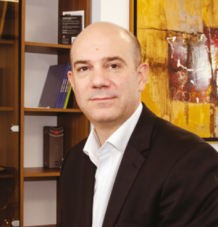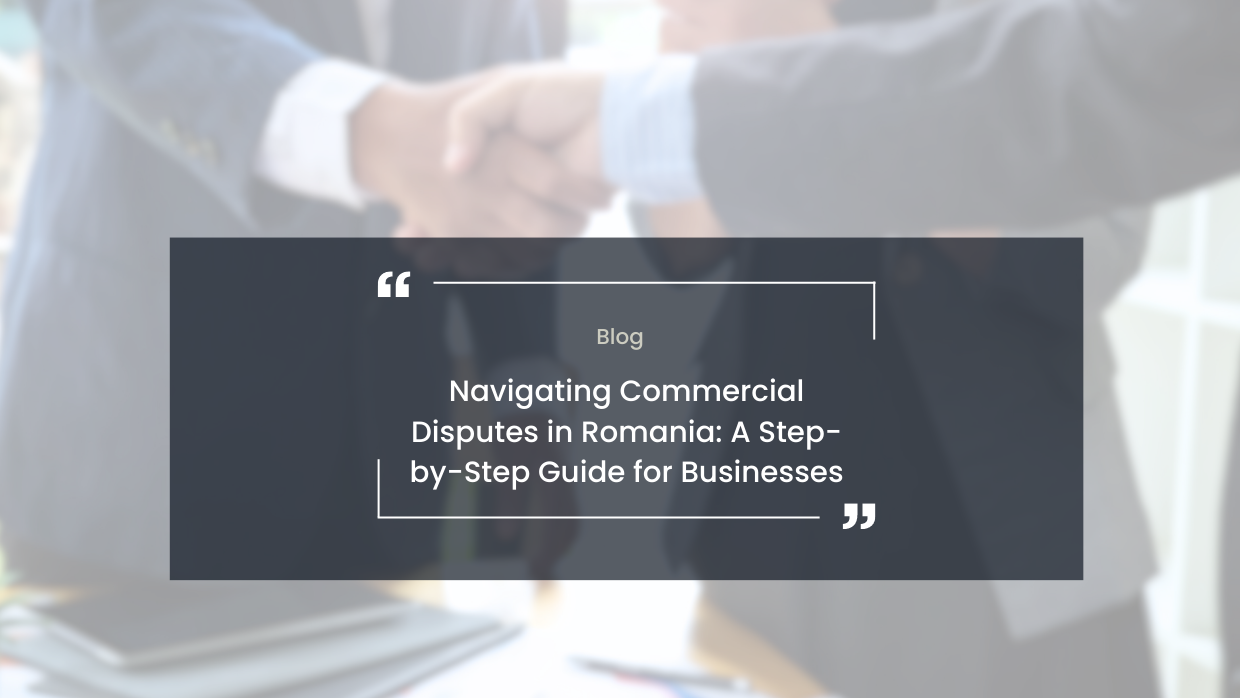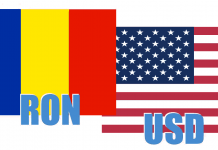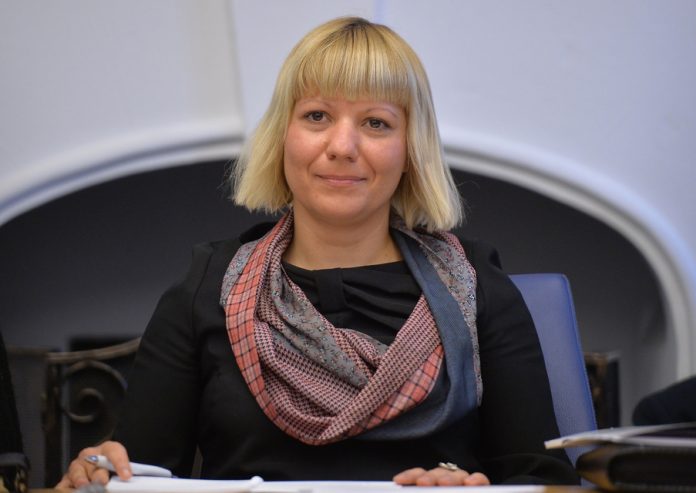They have all won awards (one the Nobel Prize). They have all struggled and sacrificed. They have all pursued excellence and integrity. They have all fought for accountable government, rule of law, human rights—and a better world.
 The Judge. Camelia Bogdan.
The Judge. Camelia Bogdan.
Bogdan was the first judge in Romania to issue criminal sentences against corrupt politicians and business leaders, seizing proceeds of crime worth tens of millions of euros. But the success of her anti-corruption work has come at significant personal cost. In February 2017, she was expelled from the Romanian Magistracy on charges of conflict of interest following a seminar she gave to public servants on anti-corruption issues.
The charges hinged on the fact that Bogdan was trying a high-profile corruption case against a Romanian media mogul at the time she gave the seminar to civil servants. Although the conflict of interest accusation was rejected, the Superior Council of Magistrates in Romania found that teaching the seminar in exchange for a nominal fee was incompatible with the office of magistrate. The decision was devastating, of course, for a judge, but also a blow to the growing anti-corruption movement in Romania—and a move seen by many as an effort to intimidate others.
What drives you? What are you fighting for? Was there one defining experience or one particular source of inspiration in your life?
Ever since my early childhood, I have always felt a need to stand up for those fighting injustice and demanding respect for the rule of law. All this is embedded in my inner nature. Fighting for justice in fragile democracies confronted with endemic corruption both as judge and victim is what drives me. The collapse of communism three decades ago created opportunity for kleptocracy. There is no democracy without rule of law, independent courts, and accountable government. I’m passionate about these things.
Under Donald Trump, in particular, America seems to be losing its interest in supporting and promoting human rights and democracy abroad. Have you felt a change? Is there any impact on you and your work?
Donald Trump nominated an excellent Ambassador to Romania, Adrian Zuckerman. His Romanian background allows him to build his personal relationships. I am convinced Zuckerman is determined to defend the rule of law. I am hopeful he will stick with us in delivering the clear message: Crime does not pay.
What do you think of when you hear the words “Democracy in America”?
Commitment to the rule of law, sticking to one’s principles. The United States has its flaws; the country makes mistakes. But there always seems to be a compass, a determination to correct and self-correct.
What do you think of when you hear the names Vaclav Havel, Nelson Mandela, Martin Luther King Jr.?
Solidarity, resilience. We all need inspiration. Martin Luther King Jr.’s voice is paved in my soul. I am totally committed to his legacy.
What is the biggest mistake we in the West have made in the past 30 years? And can we repair the damage?
Taking the rule of law for granted. We needed even more support in transitional democracies for training and supporting competent and independent judges and prosecutors. One cannot do enough in this area. One cannot underestimate the role played by organized crime, corruption, and kleptocracy in impeding the development of healthy, stable democracies in Eastern Europe. Communism was a nightmare, but democracy is not a gift. The fight for democracy has in some ways only just begun.
 The Historian. Ladan Boroumand.
The Historian. Ladan Boroumand.
Boroumand is the co-founder (with her sister Roya) of the Abdorrahman Boroumand Center for Human Rights in Iran. The group’s online library documents human rights abuses committed by the Islamic Republic and memorializes its victims.
A historian by training, Boroumand is the author of La Guerre des Principes (1999), a book that examines tensions between human rights and national sovereignty during the French Revolution. She has published numerous articles on the French Revolution, the Islamic revolution in Iran, and the nature of Islamist terrorism. She is a leading analyst of the history of secular ideas in Iran, of contemporary debates within the Iranian intelligentsia as well as within the Shi‘a clergy.
In 1991, Boroumand’s father—a Social Democrat involved in opposition activity—was murdered by agents of the Iranian regime in his Paris apartment.
[Read: Our recent interview with Ladan Boroumand]
What drives you? What are you fighting for? Was there one defining experience or one particular source of inspiration in your life?
I fight for human dignity and freedom. They constitute the sine qua non of both love and the quest for understanding the world in which we live. Soul-searching and freeing myself from my own fears and prejudices have been a constant preoccupation—my way of safeguarding the integrity of my freedom and my capacity to love.
Fighting for universal human rights of all human beings is for me an injunction of love. I am focused on Iran because it is my country, but universal human rights matter for me—in China, Russia, Venezuela, and all other countries in the world.
The Islamic revolution of Iran has been a defining experience in my life. It was a firsthand experience of the crucial importance of ideas in history. Ayatollah Khomeini was able to impose an idea alien to the vast majority of his society. There were circumstances that facilitated his ascension to power, which could be explained by historical, cultural, sociological, and economic factors. But had he had a vision; he was able to implement it.
I also learned about politics and discourse. Going through a revolution is also learning about the complexity of human behavior. In a matter of 24 hours, your long-term friends become your foes. Those you thought brave suddenly act cowardly, and ordinary people behave heroically.
For me, the Islamic revolution meant exile, and exile was the opportunity to reinvent myself. Exile was also the beginning of a journey through the fascinating intellectual and political history of the West. Exile taught me how questioning, learning, and understanding a culture can create a sense of belonging much stronger than the sense of belonging to a culture by birth. My quest for understanding the West has shaped my quest for understanding Iran.
Under Donald Trump, in particular, America seems to be losing its interest in supporting and promoting human rights and democracy abroad. Have you felt a change? Is there any impact on you and your work?
The “America First” slogan heralds an isolationist era. But Iran constitutes a particular focus of Donald Trump’s Administration. The President’s tweets in Farsi mention human rights for the Iranian people.
Trump’s actual policy regarding pro-democracy forces in Iran is no worse than President Obama’s policy. The impact of the Trump Administration regarding Iran as far as we, the Iranian human rights community, are concerned, is rather positive. Many officials guilty of gross human rights violations have been sanctioned by the U.S. government precisely because they violated Iranians’ human rights, and this is what we have been always asking for. We also approve of the sanctions imposed on the Islamic Revolutionary Guard Corps as an institution sponsoring terror.
What do you think of when you hear the words “Democracy in America”?
Tocqueville first. But in two words I would say “needs fixing.” The electoral system, the lobbying power of big corporations, and the influence of economic powers over politics are concerning to me. Larry Diamond’s latest book, Ill Winds, helped me better understand where reforms are needed in U.S. political institutions. As a person used to French politics, the sums of money poured into election campaigns in America seem insane and democratically very problematic.
What do you think of when you hear the names Vaclav Havel, Nelson Mandela, Martin Luther King Jr.?
I admire Martin Luther King Jr. for using love, non-violence, and civil disobedience as a means to establish African Americans’ equal rights and dignity in the United States. I admire his steadfastness and his capacity to fight without hatred.
Nelson Mandela is for me a leader who succeeded in a peaceful transition from a very oppressive and violent regime of racial domination to democracy; he is in my view a shrewd statesman from whom we Iranians need to learn—in particular from his leadership and extraordinary achievement in containing violence during the transition. But he is also the statesman who laid a wreath on Ayatollah Khomeini’s tomb, and that is what distinguishes him from the one I consider my moral, intellectual, and political guide: Vaclav Havel.
I received The Power of the Powerless in late 2004, and though I knew and admired Vaclav Havel as an illustrious dissident, I must confess I had not read him. I was impressed by Havel’s understanding and clear way of spelling out the truth through the fictitious layers of totalitarian ideology—an achievement that requires a rare intellectual strength and self-confidence. But more importantly, speaking truth to the multitudes is a far more intimidating task than speaking truth to a tyrant. And that is precisely what Havel did in The Power of the Powerless.
Havel set out to write an open letter to the leader of his country, Gustáv Husák, when all hopes were crushed and the Czechoslovak Communist Party had declared complete victory over the reform movement. The situation appeared to be hopeless in Czechoslovakia, and any attempt to react was dismissed with skepticism and cynicism. That is precisely when, instead of submitting to the rules established by the oppressor, Havel takes his pen and redefines the rules of the game.
The subversive nature of those 30 pages addressed to the almighty leader of his country! With a pen and an amazing strength of mind, in one stroke the powerless dissident dismisses the ideological postulates of his adversary and replaces them with the only valid one: that of human dignity and freedom. Then, based on this new postulate, in line after line, paragraph after paragraph, he transforms into utter defeat what appeared, to the world, to the government, and to the Czech people, a spectacular victory for the regime. By expressing his thoughts in the form of a letter, Havel calls upon the leadership to face its responsibility, as he as a citizen assumes his share of responsibility.
He then addresses his fellow citizens on the basis of their responsibility, and he demonstrates with the same rigorous analysis how, by their acquiescence in living a lie, they have become accomplices in their own oppression. And instead of seeking victory in the fall of the regime, he points to a different victory, one that depends only on each individual’s will and decision to live in truth. Thus, from Havel’s standpoint, there is no defeat in engaging in the struggle for human rights. At worst, one restores one’s own dignity and free will and reconnects to history and to the human community; at best, one contributes to the establishment of free institutions in one’s homeland.
With Havel’s permission, we at the Abdorrahman Boroumand Center translated both “Dear Doctor Husák” and The Power of the Powerless into Farsi. Thousands of eager Iranian citizens have read and discussed Havel’s writings, and I was particularly pleased to hear Mohammad Rasoulof, the Iranian filmmaker, laureate of the Berlin film festival, refer to the “Power of the Powerless” as a source of inspiration for his film There Is No Evil.
What is the biggest mistake we in the West have made in the past 30 years? And can we repair the damage?
The West’s biggest mistake was to misunderstand the nature of the Islamist phenomenon. The West did not realize that Islamism is a new form of totalitarianism whose raison d’être is to fight the liberal democratic worldview. No matter how appeasing Western diplomacy and policies are, they will not succeed in establishing a stable peace with Islamism, for Islamism feels endangered by the very existence of liberal democracies, and will be in a latent state of war with them as long as they exist. Just listen to what Iran’s Supreme Leader says about the West in his speeches. To repair the damage, the West needs to change its paradigms, revise its strategy toward the Islamic Republic of Iran, and wage the ideological war Islamism has declared against it since 1979.
 Legal Advocate for the Poor and Disenfranchised. Cassie Chambers.
Legal Advocate for the Poor and Disenfranchised. Cassie Chambers.
Chambers grew up in one of the poorest parts of the United States: the Appalachian hills of eastern Kentucky. She graduated Yale College, the Yale School of Public Health, the London School of Economics, and Harvard Law School, where she was president of the Harvard Legal Aid Bureau, a student-run law firm that represents low-income clients.
She was instrumental in helping pass “Jeanette’s Law” in Kentucky, a law that eliminated the requirement that a victim of domestic violence pay the legal fees of an abusive spouse in a divorce action when the spouse is incarcerated for crimes against the petitioner. Her recent book on women’s experiences in Appalachia is in some ways in dialogue with J.D. Vance’s Hillbilly Elegy.
Today, Chambers works with low-income women in Kentucky and is the vice chair of the state’s Democratic Party.
What drives you? What are you fighting for? Was there one defining experience or one particular source of inspiration in your life?
I feel passionately about sharing the stories of women in Appalachia. Those voices aren’t heard often enough, and I think it’s so important that people understand the strength of women in the mountains. That’s why I wrote the book Hill Women to tell those stories and magnify those voices. And the reason it’s important to share those stories is because communities in Appalachia are struggling, and I believe telling those stories is how change happens. I think individual narratives are a powerful tool to drive policy that can lift up communities. It was inspiring to see this power firsthand when I worked with a former client of mine, Jeanette, to change a law that required survivors of domestic violence to pay the legal fees of their incarcerated spouses. Jeanette was a domestic violence survivor, and I believe it was the power of her story that changed the law.
Under Donald Trump, in particular, America seems to be losing its interest in supporting and promoting human rights and democracy. Have you felt a change? Is there any impact on you and your work?
I continue to advocate for access to court systems for low-income individuals, and I think in many ways this work has been unchanged. Our court systems are so local, and the problems that plague them seem separate from politics in many ways. I like to try to frame the access to justice work as a problem that really shouldn’t be political—we should all want this branch of government to be open to every citizen. But I do recognize that folks who practice in certain legal fields—such as immigration law—have felt a huge change in the way they do their work under the current Administration. Although a lot of the change has been bad and made it harder for them to do their work, I think it’s also important to recognize the huge outpouring of support from people all over America in direct response to some of the actions by the current Administration.
What do you think of when you hear the words “Democracy in America”?
For me, I think about all of the ways we can still improve our democracy. In Kentucky, we still have laws that permanently take away the right to vote from people convicted of felonies. And over-policing of communities of color in our state means that we disproportionately disenfranchise these communities. There is some hope—our new Governor recently issued an executive order that restored the voting rights of 150,000 Kentuckians—but there are still so many people in our state that cannot vote, for one reason or another.
What do you think of when you hear the names Vaclav Havel, Nelson Mandela, Martin Luther King Jr.?
I think it’s amazing to remember the way an individual can make a tangible difference. For Martin Luther King Jr., in particular, I’m always struck by how young he was. It makes me feel like there’s no excuse not to be dreaming big and trying to work for large-scale change.
What is the biggest mistake we in the West have made in the past 30 years? And can we repair the damage?
Given the work I do, I spend the most time thinking about the ways America hasn’t taken care of our own at the level we should. I look at everything from income disparity to our lack of paid parental leave, and it strikes me that we have a long way to go. I think as a country we need to remember the importance of investing in people, both in our own backyard and abroad. Our country and world are so connected, and we have to find ways to tap into the potential of people.
 The Investigative Reporter. Khadija Ismayilova.
The Investigative Reporter. Khadija Ismayilova.
Ismayilova has been a journalist for Radio Free Europe/Radio Liberty and is a member of the Organized Crime and Corruption Project. In January 2013, she was among dozens of peaceful protesters who were detained for participating in a demonstration in Baku.
In June 2013, the Binagadi District Court sentenced her to 220 hours of community service, sweeping streets. Ismayilova told the court she was content with the verdict, as “clearing this country of rubbish” is something she was used to. Many of her supporters expressed their wish to join her in sweeping the streets—at which point, the district court changed the order, saying the court would replace the sweeping with indoor service options.
Her work reporting on state-level corruption in Azerbaijan resulted in her receiving a seven-and-a-half-year prison term in September 2015. Ismayilova’s research discovered, among other things, that the 11-year-old son of the country’s President owned real estate in the United Arab Emirates worth roughly $44 million. Since then, she has been released from prison but is not permitted to leave Azerbaijan.
[Read: Editor in Chief Jeffrey Gedmin’s profile of Khadija Ismayilova]
What drives you? What are you fighting for? Was there one defining experience or one particular source of inspiration in your life?
I believe in the power of questioning and in everyone’s right to know. What I am doing is normal; it is not something extraordinary. It is a journalist’s job to search for facts and to make them public. The problem is that those who have unlimited power prefer to break the mirror instead of correcting what is wrong.
The assassination of Elmar Huseynov was a turning point in my career. He was the only journalist who was investigating the family in power and openly criticizing them, while we all were keeping ourselves busy with easier reporting subjects. When he was murdered in March 2005, I felt guilty for leaving him alone in the field, because this made the masterminds think that by eliminating him, they would ensure his silence. This was the key point.
As for a personality, Salatin Askerova, an Azerbaijani war reporter from the early stage of the conflict in Karabakh, is the main person who taught me that my gender is not an obstacle for this job. She taught us that being a woman should not prevent us from facing difficulties. She was killed during one of her reporting trips.
Under Donald Trump, in particular, America seems to be losing its interest in supporting and promoting human rights and democracy. Have you felt a change? Is there any impact on you and your work?
I would say we didn’t feel commitment to values for a longer time than Donald Trump’s tenure. The United States had other “more important” interests in the region for many years. Azerbaijan had become an important ally serving as a transport link during operations in Afghanistan and Iran, and this made the regime in Baku feel too important to listen to advice from Western democracies. There was a time when a letter from Secretary Albright would rattle its recipients and shift political processes in Azerbaijan. Then there was a time when Condoleezza Rice was mocked by officials in Azerbaijan’s presidential administration. Either the regime in Baku has become stronger, or the United States has become weaker.
We have witnessed how corruption has affected American diplomats. Three former Ambassadors of the United States got directly or indirectly employed by the Azerbaijani regime after their tenure. They have been instrumental in undermining any democracy dialogue between the two countries. They have whitewashed the image of the Aliyev regime.
We have witnessed hostile actions of the Azerbaijani regime towards U.S. entities—a crackdown on American NGOs, the closure of congressionally-funded Radio Free Europe/Radio Liberty—while Russian propaganda tools freely operate in Azerbaijan.
Donald Trump’s presidency has come with its own surprises. When Azerbaijan’s President was criticized for appointing his wife as Vice President, regime supporters pointed their fingers at the White House employing Trump family members. And President Trump’s attacks on journalists—Mr. Trump’s example helps regimes like Aliyev’s to portray authoritarian practices as something normal.
What do you think of when you hear the words “Democracy in America”?
I think democracy in America is being challenged now as never before. At some point, I was offering to help colleagues from the United States in coping with difficulties of living in a country with a thin-skinned President. The most important and tragic challenge is the cultural change coming with the current leader of the United States—an advanced Western democracy employing Byzantine mores for doing business, undermining its own moral standards.
In 2017 I wrote a post on Facebook. Here is part of it:
In 2006 I went to the U.S. to work for Voice of America. I spent 18 months there. I found it amazing how important truth was in this country. Politicians being tried for lying, parents trying hard to tell only truth to their children, false testimonies in the court having consequences. All this was so different from what we had back in my country, Azerbaijan.
[…]
America was not ideal. There were lies in the U.S. too, but I had the impression that it is not cool to lie in this country. When American people found out about Clinton, it had consequences. When they believed that Bush had lied to them about WMD, they cast their votes for the opposing party.
But now? Every day there is a lie coming directly from the president, and it is becoming routine. I wonder if Americans understand the risk.
What do you think of when you hear the names Vaclav Havel, Nelson Mandela, Martin Luther King Jr.?
They were dreamers and their consistent fight for their values helped make their dreams true. They taught us never to give up, and that justice, while it might be delayed, will prevail. They taught us to dream big and overcome the obstacles. When we face troubles, I think of them, as the founding fathers, the sacrifices they gave—and then I think, who am I to complain about the minor troubles we have? They inspired generations and changed the path of history.
What is the biggest mistake we in the West have made in the past 30 years? And can we repair the damage?
I think the biggest mistake is that Western democracies do not accept the fact of globalization. Making progress without ensuring prosperity and peace worldwide is no longer possible. Poverty, corruption, environmental crises—these are dangers for your own countries, too, even if it is happening too far away from your borders. Evils like corruption are contagious. They recognize no borders. Hazards to the environment can’t be local. Even the proxy wars in other continents are able to affect your own stability.
In the past 60 years, world politics has increasingly become a subject for investigative journalists to tackle—a task for people who follow the money and corruption behind big political decisions of world leaders. Diplomatic corruption and commercial interests in arms proliferation are now scrutinized more frequently, and the dark side of world politics is becoming more transparent. It is time to learn how to build a real friendship with other nations, without ulterior motives.
 The Journalist. Gordana Knezević.
The Journalist. Gordana Knezević.
Knezević, deputy editor-in-chief of Oslobođenje, was forced to take the helm when her boss was injured by sniper fire in the early days of the siege of Sarajevo. The paper was printed at night under battlefield conditions and distributed at dawn. The independent newspaper both chronicled the fighting and provided a manual for survival. It became a source of information and a symbol of defiance in a city of 400,000 trapped, hungry, and embattled people. The Serbian-born Knezević was one of the most active writers-editors-organizers at Oslobođenje. She fought both for the survival of the paper and for free journalism.
The siege of Sarajevo lasted from 1992 to 1996. In 1996, Gordana moved with her family to Canada, where she became the target of protests by fellow Serbs because she had supported the NATO bombing in Yugoslavia.
[Read: Contributing Editor Martha Bayles’s profile of Gordana Knezević]
What drives you? What have you been fighting for in your professional life? Was there one defining experience or one particular source of inspiration for you?
To get the news right. That was not so easy before Google. We had to do a lot of work and a lot of talk before we knew we got it right. It was important in peacetime and even more important during wartime. But this did not mean being merely a conduit for raw information. We were also gatekeepers. We were expected to know more, to be better informed, so that we could inform the public by separating fact from fiction, but also communicating what was essential.
I remember one incident in particular which helped shape my destiny. My son was 13 years old and he was angry with me on the way back from school. We were in Cairo at the time, the first Gulf War was dominating the news and refugees from Kuwait were flooding in. I was even more absorbed in my work than usual, and my son scolded me: “News, News, News! Is there anything more important than news for you?” I told him that if he could think of one single thing that was more important, I would immediately apologize. After giving it some thought, he started to laugh: He couldn’t think of anything more important than the news. I laughed too, and we moved on.
Not long after, back in Sarajevo and with our own war looming on the horizon, it was clear to me from the start that two things above all would be essential for the survival of the city: food supplies, and news—and indeed the municipal bakery and my newspaper were the only two enterprises that continued to function throughout the war. It was that sense of duty and the role of the journalist that also led to some painful personal choices—above all the decision to stay behind in wartime Sarajevo while two of my children were alone abroad.
Under Donald Trump, in particular, America seems to be losing its interest in supporting and promoting human rights and democracy. Have you felt a change? Is there any impact on you and your work?
Since Donald Trump became President, America’s relationship with the rest of the world has changed in many obvious and not-so-obvious ways. One subtle but important change that I have observed in the Balkans is the loss of a standard (of politics and democracy) that the United States used to represent. It’s as if the mirror has been broken. We’ve lost the basis of comparison and the standard against which to judge our local politicians. It is now hard to say who has less respect for democratic norms, for the freedom of the press, etc.—our own politicians or (some of) their American counterparts. The United States used to be a model, but that is no longer the case. That is a new development.
At the level of political ideology and rhetoric, radical nationalism or even racism is no longer proscribed; it cannot be thought of as some local anachronism or a measure of the distance between us (in the Balkans) and the Western Democracies (and the United States in particular)—it is merely another, “legitimate” opinion, and even seems (or can be plausibly presented as being) very much in tune with trends in more “advanced” countries. In a more general sense, we are in the age of competing “opinions,” unmoored from any universal ethical, moral, and democratic standards against which they are to be judged. This is very dangerous to democracy, especially in regions where its roots are not very deep.
What do you think of when you hear the words “Democracy in America”?
The first thing that used to come to mind is a network of institutions, the “system” of government, with its checks and balances—the idea that ultimately it did not matter greatly who the President was, because the system was robust, and could not fall prey to a charismatic demagogue. Also that U.S. foreign policy was guided by certain principles and goals that were more or less unchanging regardless of who held the presidency, not least the commitment to the defense of democracy against authoritarianism. This is not to say that the United States did not have its strategic alliances and biases, based on other criteria and interests, or that it did not make mistakes. But relative to any other power it was seen as an honest broker. Again, all that has changed as the power of the presidency is wielded to override traditions and norms, and policy seems to be determined by volatile individual whims of a person, who also sees foreign policy almost exclusively as a tool for shoring up his power domestically.
What do you think of when you hear the names Vaclav Havel, Nelson Mandela, Martin Luther King Jr.?
Vaclav Havel, Nelson Mandela, and Martin Luther King Jr. are symbols of moral integrity, and of the time in which they were active. I can speak about Havel in particular as he used to be a contributor to RFE prior to becoming the first President of the new democratic Czech state. He was a tiny little man, a man of culture, who ultimately triumphed over the Warsaw Pact. Havel, Mandela, and King all had something in common: All three of them were able to envisage a more just, a more free, and truly democratic society. But they were also more attuned than most to sensing the dangers ahead, and looming threats to freedom and democracy. Havel was no longer in power when the U.S. Administration was about to press the “reset button” with Russia. He wrote a letter cautioning against this, warning that the fall of the Soviet Union had not fundamentally changed Russia’s ambitions and the nature of Russian politics. But the message was never received on the other side of the Atlantic.
What is the biggest mistake we in the West have made in the past 30 years? And can we repair the damage?
The biggest mistake was the second Gulf War. It was already clear at the time that Iraq didn’t have anything to do with September 11. The world is undoubtedly a better place without Saddam Hussein but that alone cannot be the basis for waging war. And the cost of Saddam’s removal has been enormous. The war started a chain of events that has seen the Middle East engulfed in war and political unrest up to the present day. The region is more unstable than at any time in modern history, and the cause of democracy has been set back rather than advanced, as the short-lived Arab Spring gave way to what seems like an endless winter. Moreover, public trust in Western governments was undermined at home and abroad, and the current lack of trust not only in individual politicians, but the system of government as a whole is partly a consequence of that misguided military adventure.
Whether the damage can be repaired is not easy to say, but it must begin with a renewed engagement by the United States—in the Middle East, in the Balkans, in Eastern Europe—as a leader, as a defender of democratic values, and not merely another power jockeying for regional influence alongside Putin’s Russia, Erdogan’s Turkey, and China.
 The Human Rights Activist. Nadia Murad.
The Human Rights Activist. Nadia Murad.
Murad was 19 years old when Islamic State (ISIS) members attacked her village of Kojo in northern Iraq. A member of the Yazidi minority group, Murad witnessed ISIS slaughtering hundreds of Kojo’s inhabitants, including her mother and six brothers. Captured in August 2014 and held in captivity in Mosul where, along with thousands of other Yazidi women, she was abused, Murad managed to escape to Germany later that year.
Murad has since emerged as one of the world’s leading activists fighting for the survivors of sexual violence. She founded Nadia’s Initiative in order to assist victims in Iraq. In 2018, Murad was co-awarded the Nobel Peace Prize for her work.
What drives you? What are you fighting for? Was there one defining experience or one particular source of inspiration in your life?
I am fighting to help my community recover from the genocide ISIS carried out in 2014. Our continued fight is an existential one—the effects of the aftermath of genocide still weigh on the Yazidi community. ISIS came to kill, destroy, and enslave Yazidi men, women, and children. My organization fights to counter what ISIS did, by rebuilding the Yazidis’ ancestral homeland, exposing the crimes of sexual violence ISIS carried out against Yazidi women and children, and bringing ISIS to justice in a court of law.
Under Donald Trump, in particular, America seems to be losing its interest in supporting and promoting human rights and democracy. Have you felt a change? Is there any impact on you and your work?
Since 2003, there has been a rise in radical terrorist groups in Iraq. Yazidis have been targeted by different groups, including al-Qaeda and ISIS. As a small religious minority, Yazidis will not be able to recover from this genocide without international support. America holds a lot of power in the international community. I have asked the American government to support the redevelopment of the Yazidi community and to pursue justice for survivors, so the community can heal. The international community has a moral responsibility to protect minority groups like the Yazidis from ethnic cleansing and genocide. The fight for justice and peace in Iraq is connected to the fight for justice and peace in America and Europe.
What do you think of when you hear the words “Democracy in America”?
I think the existing democratic societies in the world are far from perfect, but that does not mean that democracy should be taken for granted. Today, our world is more connected than ever. Those who enjoy a democratic system like the one in America have avenues to fight for their rights. And they can use those avenues to become a voice for communities like Yazidis in remote corners of the world where those democratic systems don’t exist.
What do you think of when you hear the names Vaclav Havel, Nelson Mandela, Martin Luther King Jr.?
These men gave their lives to fight for equality and human rights in different parts of the world. They often did so during times when speaking out against injustice was seen as a crime. But they persevered against all odds. I greatly admire them, their defense of their fellow human beings, and their sacrifice to make the world a better place for everyone.
What is the biggest mistake we in the West have made in the past 30 years? And can we repair the damage?
War leaves lasting effects on generations. War should not be a solution to all problems. Powerful nations in the West must take into consideration that small communities like Yazidis are not able to survive in conflict areas. The West shouldn’t have abandoned religious minorities in a fragile country like Iraq. We as a small community didn’t have the resources and power to protect our community from ISIS. The result was a genocide and widespread sexual violence against Yazidi women.
 The Foreign Correspondent. Dionne Searcey.
The Foreign Correspondent. Dionne Searcey.
Dionne grew up in Wymore, Nebraska. She attended the University of Nebraska-Lincoln and graduated with a degree in journalism and French. She began working as a reporter for the City News Bureau of Chicago. In due course, she would work for Newsday, the Seattle Times, the Chicago Tribune, and the Wall Street Journal. Today she is the politics reporter for the New York Times.
What drives you? What are you fighting for? Was there one defining experience or one particular source of inspiration in your life?
Journalism drives me—the ability to work for an independent press that allows me to tell the truth in my reporting, regardless of what that truth may reveal. My most inspiring reporting was done as West Africa bureau chief for the New York Times, a job that introduced me to a set of incredible women who found clever ways to overcome patriarchy in all its forms. I detail their experiences, including those of suicide bombers who found ways to dodge militants, women who wanted out of loveless marriages and others, in my new book, In Pursuit of Disobedient Women, which comes out March 10 from Random House.
Under Donald Trump, in particular, America seems to be losing its interest in supporting and promoting human rights and democracy. Have you felt a change? Is there any impact on you and your work?
While I was in West Africa, President Trump issued visa bans on certain countries and called some African nations “shithole countries.” Government officials complained America had no foreign policy in Africa. It was an awkward time to be working on the continent for an American newspaper. But the Times, fortunately, has a stellar reputation for its reporting, and I didn’t experience anyone who didn’t want to speak with me because I was an American. Some people did want to complain about President Trump, but others, surprisingly even in countries he had insulted, supported him for his bluntness.
What do you think of when you hear the words “Democracy in America”?
Because I’m a journalist, my mind turns to free speech. That means not only a free press but also the freedom to protest and speak out about policies and practices we don’t like.
What do you think of when you hear the names Vaclav Havel, Nelson Mandela, Martin Luther King Jr?
I think of champions of justice and freedom and see them as leaders who pushed for what they thought was right at great cost to them.
What is the biggest mistake we in the West have made in the past 30 years? And can we repair the damage?
As I return now to the West, I see racism as a dangerous undercurrent that has and still is impacting so much in society from our criminal laws to our housing policies and even to which artists’ and professionals’ voices are elevated to the top echelons of their fields. I’m not sure what the solution is but it’s obvious we should have been thinking and talking more openly about this.





























